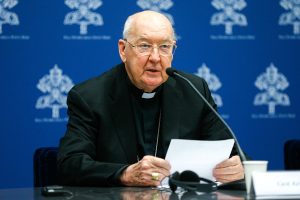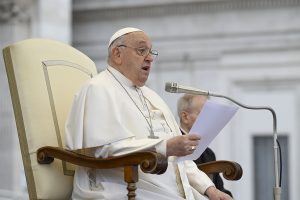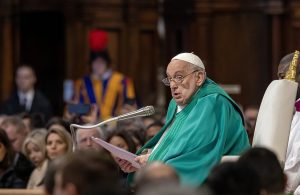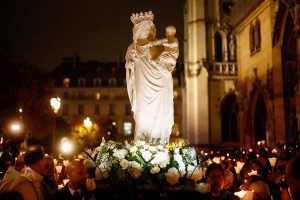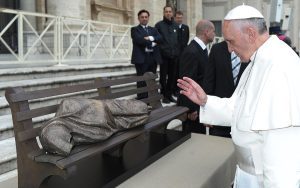WASHINGTON (OSV News) – A touring relic will give the faithful in Washington and seven states a rare opportunity to venerate St. Thomas Aquinas, one of the greatest Christian theologians.
The skull of St. Thomas, which has been on tour in Europe for the past year for observances marking the jubilees of his canonization (700 years in 2023), death (750 years in 2024) and birth (800 years in 2025) will be in Washington for two days of veneration Nov. 29 and 30.
Washington is the first of its stops in 10 U.S. cities through Dec. 18.

The Dominican medieval theologian and author of key theological works including the “Summa Theologiae” (“Summary of Theology”) died of illness during travel at Fossanova Abbey in Italy March 7, 1274, around age 49. He was canonized five decades later on July 18, 1323, and declared a doctor of the church in 1567.
The Cistercian abbey kept St. Thomas’ body until 1369. Then his relics were moved to Toulouse, France, where the Dominicans, also known as the Order of Preachers, were founded.
Dominicans in Toulouse commissioned a new reliquary for the skull’s tour. The relic was recently on display in the Czech Republic and France, and after the United States, organizers have planned for stops in Manila and Luxembourg.
The events in Washington are sponsored by St. Dominic Parish, the Dominican House of Studies and the Thomistic Institute.
The skull will be displayed first at St. Dominic Nov. 29, beginning at 12:10 p.m. with Mass celebrated by Cardinal Wilton D. Gregory of Washington. Veneration continues until 7 p.m., with vespers at 5:30 p.m. and night prayer at 6:45 p.m., concluding with a Marian procession.
On Nov. 30, the relic will be received at the Dominican House of Studies beginning with lauds and a votive Mass of St. Thomas Aquinas at 7:30 a.m. Veneration will continue until 5 p.m. with Dominican Father Gregory Pine preaching at 3 p.m.
The relic’s other scheduled visits include St. Thomas Aquinas Parish, Charlottesville, Virginia, Dec. 2; Providence College in Providence, Rhode Island, Dec. 4; St. Gertrude Priory, Cincinnati, Dec. 6; St. Patrick Priory, Columbus, Ohio, Dec. 7-8; St. Louis Bertrand Parish, Louisville, Kentucky, Dec. 10; St. Rose Priory, Springfield, Kentucky, Dec. 12; St. Vincent Ferrer Parish, New York City, Dec. 14; St. Patrick Parish, Philadelphia, Dec. 16; and Sts. Philip and James Parish, Baltimore, Dec. 18.
Besides the skull in Toulouse, another skull thought to be that of St. Thomas was found in Fossanova in 1585 and is kept nearby in the town of Priverno. In March, that skull was carried in a solemn procession with the local bishop in Priverno to mark the 750th anniversary of the saint’s death.
In 2023, a medical team examined the Priverno skull, and both skulls are currently venerated pending an eventual forensic and DNA analysis.
Relics have real power, Father James Sullivan, prior of St. Dominic’s Priory in Washington, told OSV News.
“The veneration of the relic brings about a certain devotion in the faithful,” he said. “People who are struggling feel close to saints who also struggled.”
That closeness is the point, he said. The relic “reminds us of the holiness of the person, whether martyr or pope,” he said. “It’s holiness that matters — our devotion to Christ and how closely we follow him.”
St. Thomas’ three jubilees “draw our attention to the masterwork of wisdom and sanctity which God wrought in him,” Father Pine, instructor of dogmatic and moral theology at the Dominican House of Studies and an assistant director at the Thomistic Institute, said in a Nov. 19 statement announcing the relic’s Washington stops. “The opportunity that we have to receive and venerate his relic makes this grace all the more proximate and precious to us.”
In the same statement, Father James Brent, assistant professor of philosophy at the Dominican House of Studies, said “an exceptional way” to gain wisdom and understanding “is to pray for it in the presence of the skull of St. Thomas Aquinas.”
St. Thomas’ teaching of natural theology — the belief that people can experience God’s existence through reason and experience, instead of any special revelation — makes him very accessible, Father Sullivan said.
It’s, “what you could call human flourishing — becoming a better person,” he said.

